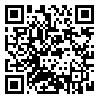BibTeX | RIS | EndNote | Medlars | ProCite | Reference Manager | RefWorks
Send citation to:
URL: http://ijer.hormozgan.ac.ir/article-1-373-en.html
2- Department of Psychology and Educational Sciences, University of Tehran, Tehran, Iran ,
3- Faculty of Health, Qom University of Medical Sciences, Qom, Iran
Objective: The current investigation was undertaken with the objective of assessing the efficacy of paradox therapy on the intolerance of uncertainty among students preparing for college entrance examinations.
Methods: The current inquiry was designed as a quasi-experimental study employing a pre-test-post-test framework with an accompanying control group. The statistical population for this research encompassed all college entrance examination candidates residing in boarding accommodations in Qom during the year 2024. A sample of 30 students was selected from the target population through purposive sampling and subsequently allocated randomly into two groups: one experimental group consisting of 15 participants and one control group comprising 15 participants. Data collection was facilitated utilizing the Intolerance of Uncertainty Questionnaire (IUS; Carlton et al., 2007) and the Test Anxiety Scale (TAS; Sarason, 1977). The experimental cohort underwent paradox therapy through a structured six-session intervention, with each session lasting a maximum of 45 minutes and occurring biweekly, while the control group did not receive any form of intervention. Data analysis was conducted using SPSS version 25, employing the univariate analysis of covariance statistical approach.
Results: The findings revealed that the level of intolerance of uncertainty in the experimental group exhibited a statistically significant reduction in comparison to the control group post-intervention relative to the pre-test assessments.
Conclusions: In summary, it can be deduced that paradox therapy constituted an effective intervention for ameliorating intolerance of uncertainty among students engaged in college entrance examinations.
Received: 2025/01/12 | Accepted: 2025/04/21 | Published: 2025/06/1
| Rights and permissions | |
 |
This work is licensed under the Creative Commons - Attribution 4.0 International. |






